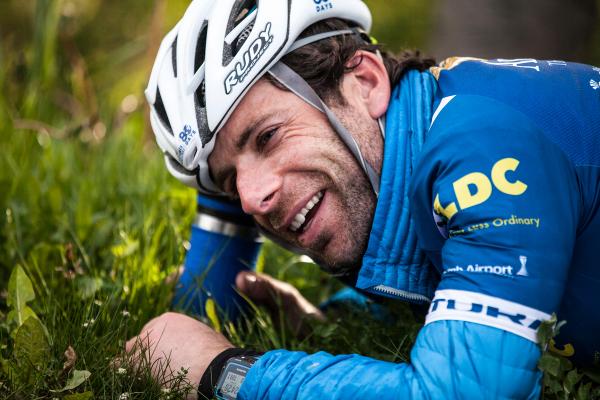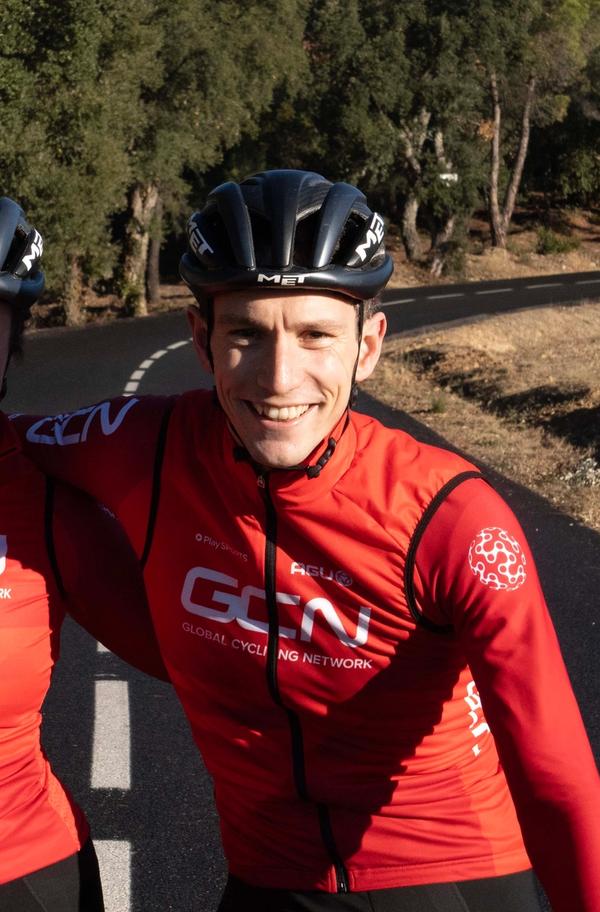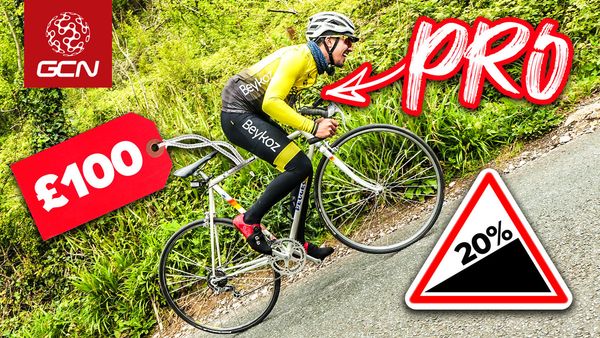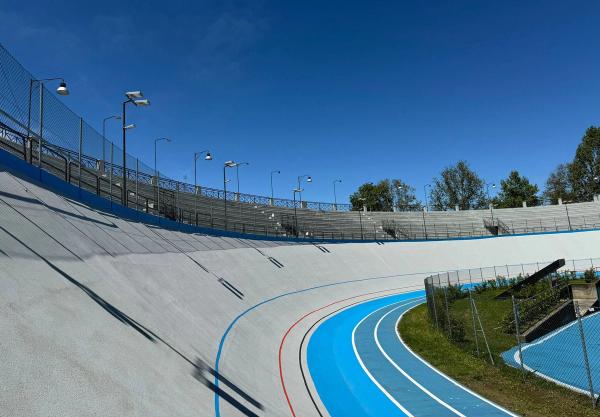Long distance cycling tips from Mark Beaumont
Advice and pointers from an ultra-endurance world record holder
James Howell-Jones
Junior Writer
Mark Beaumont is the biggest name in ultra-endurance cycling. He’s set world records no other cyclist can touch, and co-authored The Complete Guide to Cycling Psychology.
GCN’s Si Richardson sat down with Beaumont to hear what we could learn from the long-distance legend. We wanted to know what it takes to ‘go ultra’; how can we train our minds and bodies to ride further than we’d ever thought possible? Watch the full interview above, but for the key insights, read on.
Anyone can do it
Unlike most cycling disciplines, there isn't one body type that suits ultra cycling better than another.
“The wonderful thing about endurance and ultra-endurance is anyone can do it,” Beaumont said. “We can't all be hill sprint champions, we can't all be track racers, but look at those who have achieved inspiring things in the ultra-endurance world...There's no commonality in terms of body shape, age, background.”
Get familiar with the challenge ahead of you
The scale of most ultra-endurance challenges is far beyond a normal bike ride. It’s important to be familiar with the magnitude of whatever it is you’re taking on before you begin.
“I think a lot of people find themselves on the start line in these events having absolutely no idea what they've signed up for,” Beaumont told us.
“The interesting thing about ultra is you're not going to ride anything in training that’s anything close to it. Most people, even if they're doing a big training ride, will do four or five, six hours – that's normally a big road ride or gravel ride. So if you're then going into the ultra world which is likely multi-day, multi-week, you've not got an easy stepping stone to get there
“I would encourage you to do everything you can to build a reference point for what you're taking on, so do some multi-day rides so you know what it's like waking up and riding when you're tired. Even the admin around your kit, if you're bikepacking, that's a big thing.
“Do something that gives you not just the inspiration to do it, but the understanding as to who you are and how you operate in those environments. Just anything you can, especially if it comes to things like if you're going to have to ride straight through the night.”
Conditioning is crucial for ultra-endurance
For ultra-endurance riding, conditioning and core strength are just as important as your cardiovascular fitness or power numbers.
“When you get tired, when you push into bigger hours and days and maybe even weeks, it's about conditioning, and people forget about that stuff. That's about your neural system; that's about your backside; that's about your neck; that's about your hands. It's about all the stuff that happens as you put yourself through much much bigger distances and days.
“You'll beat yourself up on the turbo; you’ll do the miles; you'll be a phenomenally fit rider...but it's not until you go to the 12 hours plus or multi-day that you'll suddenly realise that you don't have that sort of deep strength. And I mean like proper deep strength: core, arms, back, neck, all that stuff.
“The physical training can only be put to good use when you're out there if you can stay relaxed on the bike: nice and neutral, keep a high cadence, keep good body separation – all that good stuff.
“We all have physical ticks, like my right knee comes out. Some people, they become very A-framed on the bike, so their shoulders come up, they lock out their elbows. Just be very conscious of how you tire on the bike and how to account for that.”
Nutrition
Being smart with your nutrition is important too. Beaumont says that for long rides, natural, easy-to-digest foods are best.
“As you get to 12 hours plus, and certainly 24 hours plus, so many people's digestion just slows down, and it feels like the body's just not prioritising it. So you need to make it as easy as possible for your body to keep working.”
With that in mind, ultra-processed food and meat is worth avoiding. Beaumont says: “I've got that golden rule that if your granny doesn't recognise it, don't eat it.”
Often, people struggle with nutrition because of dehydration. To make sure you’re drinking enough, consider smoothies and blended meals, especially if you’re riding in a hunched-over, time trial position: “I'm famous for just chucking what would be a three-course meal into a smoothie and down it goes. Anything you can do just to get your hydration in at the same time really, really helps.”
How do you push through the dark times?
When you’re riding a bike day after day, you’re going to have highs and lows. Whether you’re on top of the world or at your lowest ebb, the main thing is to remind yourself that it won’t last forever.
“Nothing is constant,” Beaumont reassured. “There's this assumption from people who have not ridden ultras that if I'm tired and I don't stop and sleep I'll get more tired. Logical. If I'm sore and I keep doing what I'm doing, I'm going to get more sore. That, logically, makes sense. It's not true: the mind and the body has this incredible ability to rebound.
“If you're feeling rock bottom, keep riding. You'll feel better. If you're feeling top of the world, bad news: it's going to get worse. But just know that that flux will happen, that will change, and when you're in your lowest ebb, when you're in your hardest moments, say to yourself, ‘ah, I'm there again. I've done this many times’.”
Something to remember when you’re really suffering during an ultra, is that the tough moments create the best memories.
“The tailwinds, the great views, the rest of it, they all blur into one. But the times where I was absolutely broken – literally broken: fractured elbows, broken teeth, you know, in a mess – and I kept riding my bike, I look back and go: that's career defining. That's life affirming.”
Forget about the finish line
Counting down the kilometres might work on a one-day ride, but if you’re days, weeks or even months from the end, it’s not helpful to fixate on the chequered flag. Instead, focus on riding the road in front of you.
As Beaumont says: “Focus on what you need to do now, so the big picture takes care of itself. Most people quit big ultra events, not because they can't do it, but because at some point, the idea of continuing to do what they're doing overwhelms them.”
Forget positive mindset, have a performance mindset
It might seem sensible to try to be positive and look on the bright side, but if you’re doing something really tough, that kind of thing isn’t going to work.
“Don't kid yourself with nonsense like positive chat. I can't stand this sort of coaching style which is just like, ‘I'll be happy, high five’...it doesn't work in the real world because you've got to be true to yourself. You've got to call a bad day bad, realise that this is hell, this is horrible, this is dark, have a wry smile, find some dark humour in that.
“I always talk about having a performance mindset, not a positive mindset, because it's not human to be positive all the time. You're going to learn a lot about yourself when you ride ultra-endurance. You're going to really find out your inner self and your inner strength, but having a performance mindset is purely about being accountable: what I think, what I do, what I say, matters. It's on me: nobody else can do this. And when you have that, as opposed to like, ‘cheer up, be happy, be positive,’ which is not particularly helpful when you're in a really dark place, it reminds you that actually, your actions matter.”
How do you know when to say enough is enough?
Treading a line between digging deep and damaging yourself can be tricky, and even Beaumont admits he’s got this wrong from time to time.
“I've given myself an injury which I thought was just like, ‘oh, I'll take a few days to get over,’ and it's taken me six months.”
Ultimately, though, Beaumont thinks that you can’t really cause that much damage by pushing yourself on a bike.
“I have to say – touch wood – I've been doing this since I was a 12 year-old kid, I'm now in my 40s, my worst injuries by far are DIY around the house, the bike's not hurt me that much.”
Ultra-distance cycling isn’t all about pain and suffering
Despite the hardships, there’s far more to ultra cycling than pain and suffering. Really, it’s all about exploration, personal achievement and travel.
“The reason I got passionate about riding a bike when I was a kid is because it can literally take you around the world. I did it when I was 12, when I crossed Scotland, and that's ended up being my career. So I've never lost that childlike wonder, in that, I wonder, ‘what's over that hill?’ I wonder, ‘how far could I go?’ And for me, it's not just the numbers, the power. For me, it's very much about the people, the cultures, the landscapes, and seeing the world change. Because you've earned those miles through riding the bike. It's addictive. It's absolutely wonderful.
“Do you need to struggle and drive? Yeah, but I think the human condition, we wouldn't be athletes if we didn't enjoy the fact that we're striving, we're pushing ourselves. So I would hate people to watch this and go, ‘ultra is not for me because I've got to to hurt a little bit’. The good points, the elation, the camaraderie, far far outweigh the suffering.”











